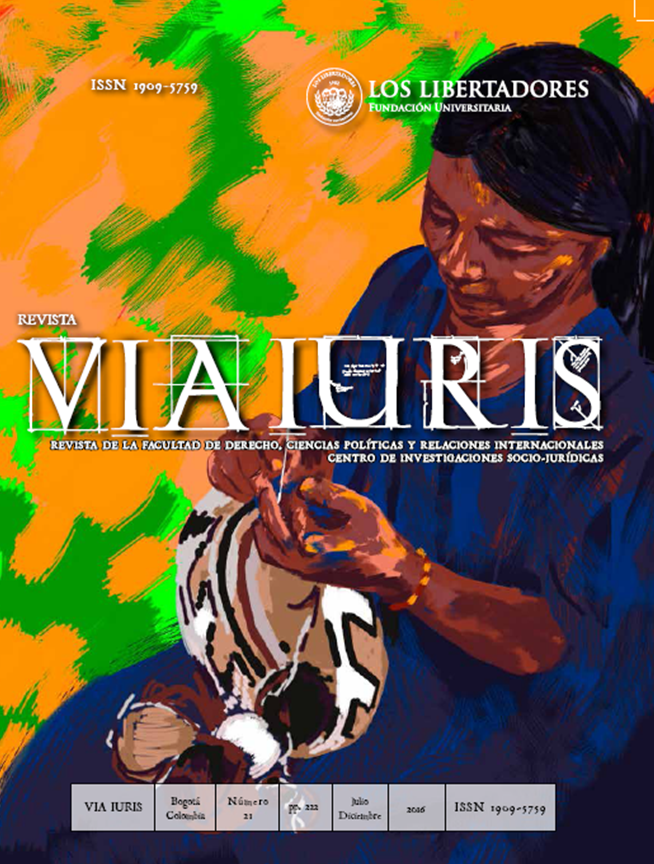Abstract
This article proposes a reflection on the implications of impunity from the political perspective of justice, in an attempt to contribute with the public debate on the issues concerning the statutory framework for the Colombian post-conflict. The methodology applied to give structure to the discussion is to support it on one of Hannah Arendt’s most meaningful works for the political philosophy tradition, articulating her premises regarding the concept of justice and its connection with legitimacy with the proposals for the statutory framework for the post-conflict in Colombia. After presenting an overview of the evolution of transitional justice, a disquisition on the political nature of legal decisions is developed. Lastly, the article finishes undermining the false dilemma between justice and peace on which the essence of the statutory framework for the post-conflict is based.
References
Acto Legislativo 01 de 2012. “Por medio del cual se establecen instrumentos jurídicos de justicia transicional en el marco del artículo 22 de la Constitución Política y se dictan otras disposiciones”. 31/07/2012. D.O. 48.508 de 31 julio de 2012.
Arendt, H. (1999). Eichmann in Jerusalem. Barcelona: Lumen.
Arthur, P. (2009). How “transitions” reshaped human rights: a conceptual history of transitional justice. Human Rights Quarterly, 31 (2), 321-367.
Centro Nacional de Memoria Histórica. (2014). ¡Basta Ya! Colombia: Memorias de guerra y dignidad. Bogotá: CNMH. Recuperado el 26 de mayo de 2016 de http://www.centrodememoriahistorica.gov.co/micrositios/informeGeneral/descargas.html
Congreso de la República. (2015). Informe de Conciliación al Proyecto de Ley Estatutaria 94 de 2015 Senado, 156 de 2015 Cámara. Gaceta del Congreso. Bogotá: Imprenta Nacional. Recuperado el 26 de mayo de 2016 de http://www.imprenta.gov.co/gacetap/gaceta.nivel
Corte Constitucional, Sentencia C-578. (M.P. Manuel José Cepeda Espinosa; 30 de julio de 2002).
Corte Constitucional, Sentencia C-986. (M.P. Luis Ernesto Vargas Silva; 2 de diciembre de 2010).
Corte Constitucional. Sentencia C-579. (M.P. Jorge Ignacio Pretelt Chaljub; 28 de agosto de 2013).
Corte Constitucional, Sentencia C-577. (M.P. Martha Victoria Sáchica Méndez; 6 de agosto de 2014).
DeJusticia. (2014). Ante la justicia. Necesidades jurídicas y acceso a la justicia en Colombia. Bogotá: DeJusticia.
Derrida, J. (2001). On cosmopolitanism and forgive-ness. London: Routledge.
Frederking, B. (2015). Putting transitional justice on trial: democracy and human rights in post-civil war societies. En International Social Science Review, 91 (1). Recuperado el 26 de mayo de 2016 de http://digitalcommons.northgeorgia.edu/issr/vol91/iss1/3
Huyse, L. (2003). The process of reconciliation. En Reconciliation after violent conflict. A Handbook. D. Bloomfield (Ed). Estocolmo: International Institute for Democracy and Electoral Assistance.
Lederach, J. (1997). Building peace, sustainable reconciliation in divided societies. Washington D.C: United States Institute of Peace Research. Recuperado el 26 de mayo de 2016 de http://www.un.org/en/peacebuilding/pbso/pdf/Reconciliation-After-Violent-Conflict-A-Handbook-Full-English-PDF.pdf
Ley 418 de 1997. “Por la cual se consagran unos instrumentos para la búsqueda de la convivencia, la eficacia de la justicia y se dictan otras disposiciones”. D.O 43201 de 26 de diciembre de 1997.
Ley 548 de 1999. “Por medio de la cual se prorroga la vigencia de la Ley 418 del 26 de diciembre de 1997 y se dictan otras disposiciones”. D.O. 43.827 de 23 de diciembre de 1999.
Ley 742 de 2002. “Por medio de la cual se aprueba el Estatuto de Roma de la Corte Penal Internacional”. D.O 44.826 de 7 de junio de 2002.
Ley 782 de 2002. “Por medio de la cual se prorroga la vigencia de la Ley 418 de 1997, prorroga-da y modificada por la Ley 548 de 1999 y se modifican algunas de sus disposiciones”. D.O. 45.043 de 23 de diciembre de 2002.

This work is licensed under a Licencia Creative Commons Atribución-NoComercial-

